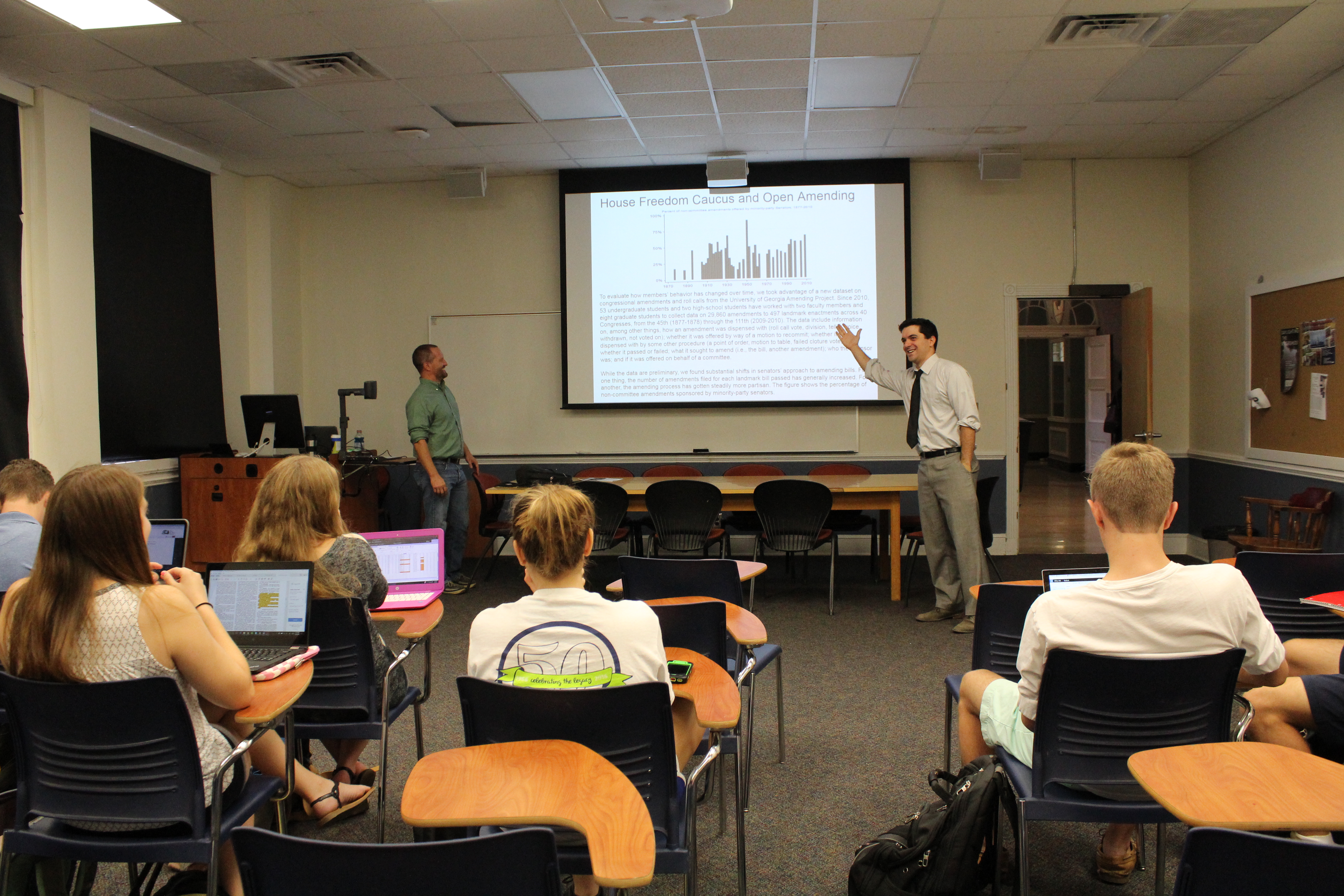By Rory Hibbler
What began as an idea for a book has since turned into a rabbit hole: production of a plethora of data, a revolutionary research class, and a forthcoming website. Associate Professors Anthony Madonna and Michael Lynch, both from the political science department, teamed up to create the University of Georgia Congress Project, the field’s first systematic effort to model the roll call generating process. Roll call votes—votes where each member’s position on an issue is recorded— have been a major focus of congressional research in the past, but according to Lynch, “most votes in Congress do not receive a roll call vote, so roll call votes alone don’t tell the whole story of lawmaking.”
The project, started in 2010, has found that only six percent of all votes on amendments in Congress are recorded, which means over ninety percent of votes amending bills have never been analyzed or looked at. The kicker is that, “Congress decides what votes to record, so they may influence our view,” says Madonna, “through picking and choosing which votes are recorded.” Their study has uncovered that Congress does, in fact, overemphasize conflict using this process. The appearance of Congress as a highly polarized, ineffective body may be partially attributed to the selective reporting of these roll call votes, as members use them strategically to prove their ideological strength to their constituents, especially when seeking re-election.
Tens of thousands of amendments later, Lynch says his most interesting finding is, “how infrequently Congress actually has recorded votes, and how inaccessible the legislative process is to the public.”
“Recently there have been lots of recorded votes on non-policy items, which are meant for election fodder,” Madonna adds. In attack ads, for example, a candidate could claim their opponent voted to raise his or her own pay, while the opponent actually just voted on a procedural measure that allowed debate on a bill containing a pay raise to continue. Because it is hard for the public to distinguish votes that impact policy from procedural votes, members are at constant risk of having their votes on non-policy items misinterpreted or intentionally taken out of context.
Initially, Madonna and Lynch intended on publishing a book analyzing this phenomena. While they continue to work on a book, the project has reached a greater potential than originally anticipated. To see how voting patterns change in Congress over hundreds of years, they enlisted the help of SPIA students in a unique undergraduate research course. Students in Special Topics in American Politics: Congressional Process and Procedure read through the often complicated and detailed congressional record – essentially reading C-SPAN – and use spreadsheets to code every amendment on a landmark bill on the floor of the House or Senate. Students look for indicators, such as who presented the amendment, which party they represented, and what type of vote was used to dispose of the amendment, to gain insight into both the amendment’s development and Congress members’ formal and informal behavior on the floor. To this day, over 36,000 amendments have been recorded thanks to 80 students and counting.
Looking to the future, Madonna had the idea to delve into more of the bill than just its amendments,
“Students are already reading these bills, so we thought to have them write up the entire procedure of historical landmark bills.”
The insight from students’ final research papers, a comprehensive bill history, is especially useful when antiqued bills become headline news. For example, the early 2016 Oregon militia standoff was protesting the Taylor Grazing Act of 1934, but there is very limited access on the internet to what this bill is, what it does, and how it came about. Madonna and Lynch hope students’ summaries of these bills passing through Congress will provide public access to and understanding of what has before been an oversimplified and mystified process.
Students who code these amendments gain a lot more than a peek into history.
“Students learn political underpinnings of how a bill becomes a law, learn about how to conduct research, and develop their own research projects,” Lynch says. Further, the professors hear from their students that “undergraduate research experience” has become a buzzword of sorts in resumes and job interviews.
“The practical training we provide them with in terms of creating and managing large spreadsheets, mastering Microsoft Excel, writing short reports summarizing their activities, and engaging in independent research, has proved valuable,” says Lynch. The class structure is very independent, mirroring real-world job experiences and giving students an in-depth understanding of Congress’ most obscure proceedings. “Students are given similar lectures and training I received while working for the Congressional Research Service,” said Madonna. Students from the course have gone on to positions with the Republican National Committee, Senator Johnny Isakson (R-GA), the Podesta Group, Rep. Jack Kingston (R-GA), the Georgia State House Rules Committee, and Rep. Jody Hice (R-GA).
Beyond the ins and outs of Congressional procedure, the project gives SPIA undergraduate students exposure to the research process as a whole, allowing them to determine if graduate school is a good fit for them. For many, it is. Students have gone on to seek law degrees at Yale, Duke, NYU, Cal-Berkeley, Chicago, and UGA. Other past students, such as Darien Stacey, Rachel Surminsky, and Jordan McKissick, are now in doctoral programs at Vanderbilt, UNC Chapel Hill, and UGA, respectively. All three alumni were so inspired by the project that they will be continuing related research in the legislative process in their own programs. Involved students have been given opportunities to assist Madonna and Lynch with writing their book, publish law review articles, and get grants of their own to do related work.
“This is a unique educational experience,” claims Dr. Madonna. “It is not a clean, textbook view of lawmaking—it is messy, confusing, and sometimes downright disturbing or comical.”






